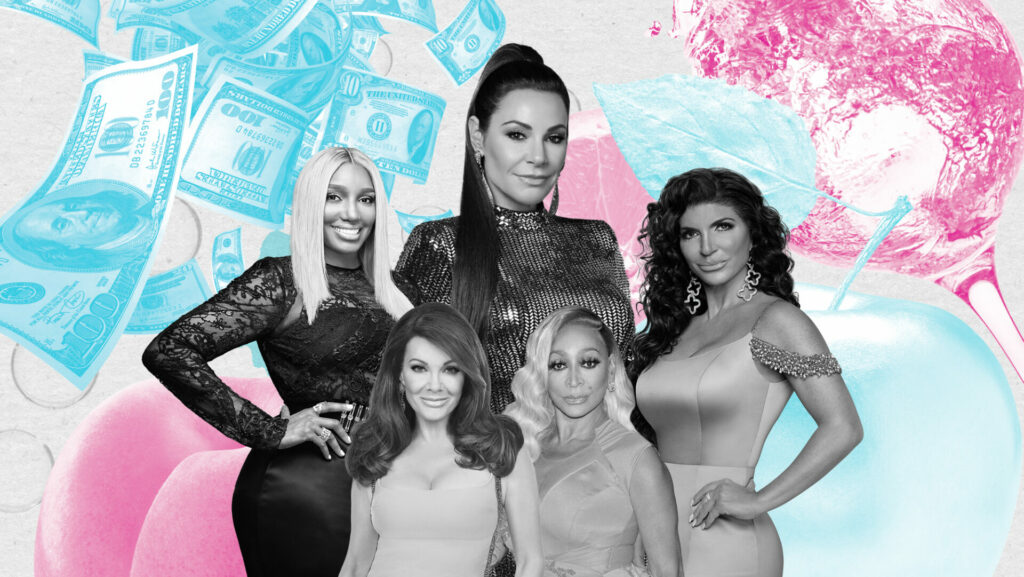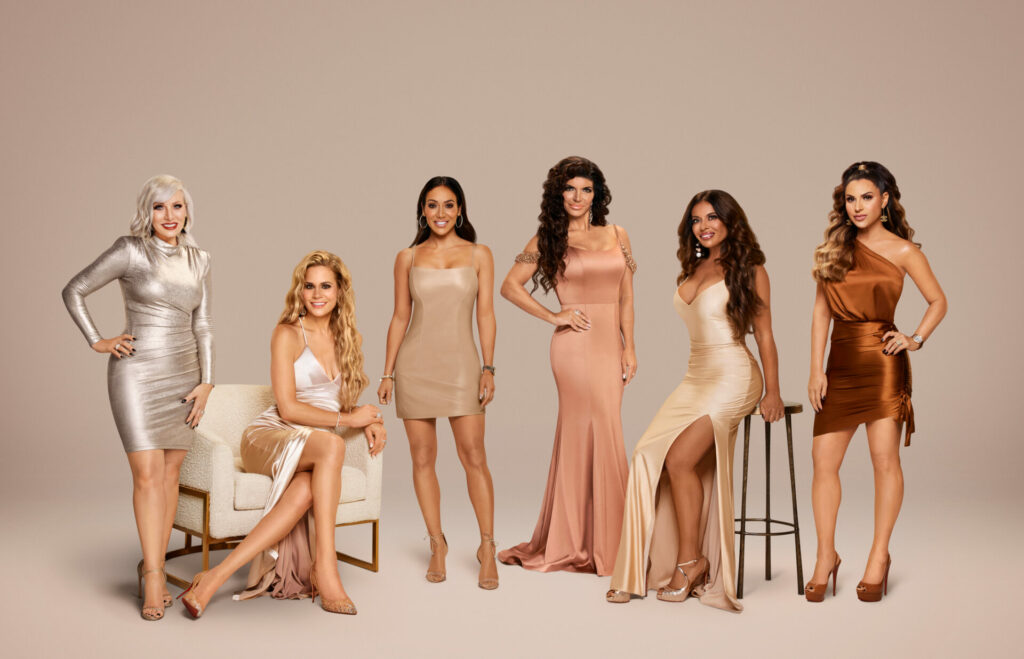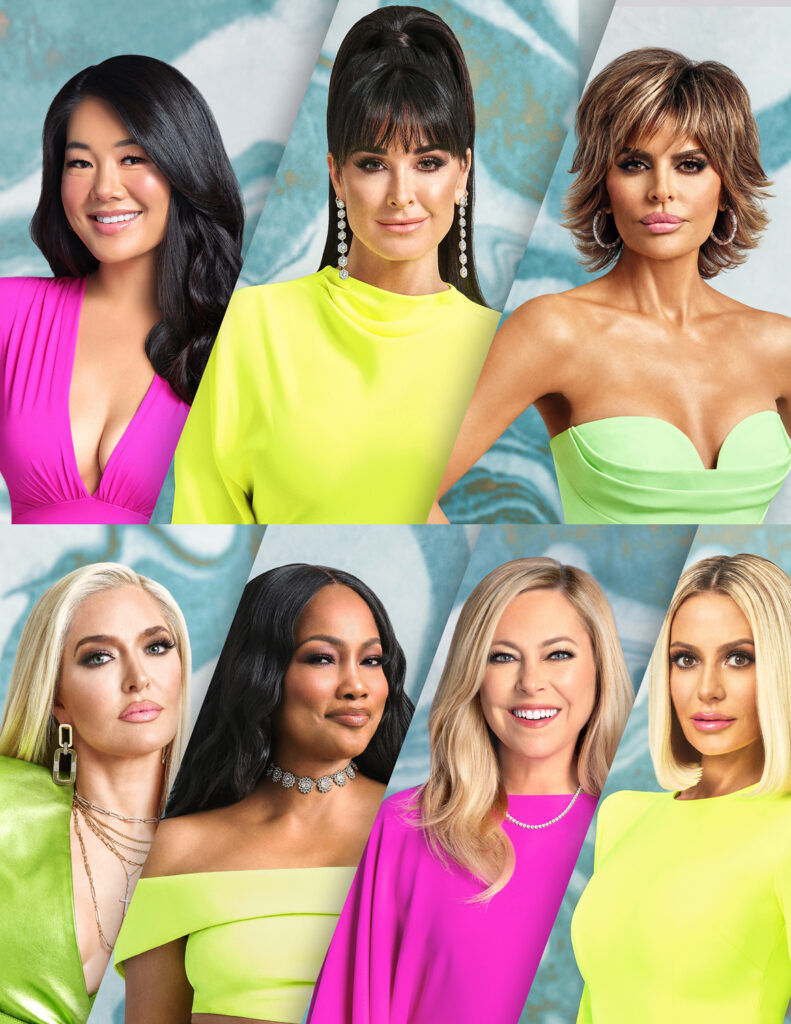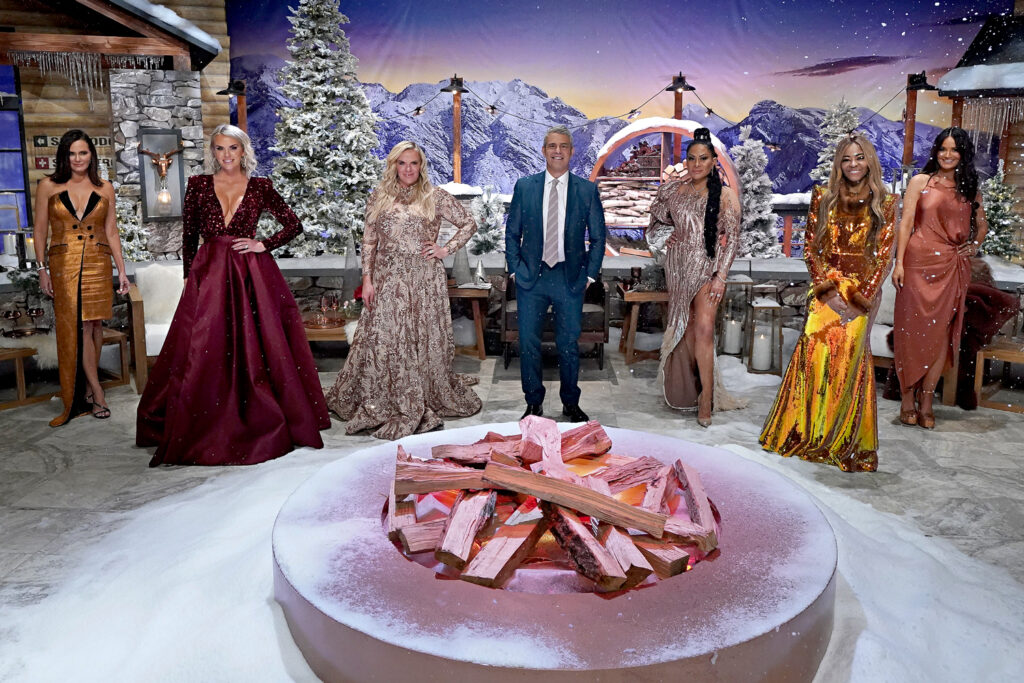Why young British women love ‘The Real Housewives’
Since 2020, ‘The Real Housewives’ franchise has gone from being a US TV phenomenon to an obsession for women in the UK. Why would we fall in love so fast and hard with dramatic, sneaky and narcissistic wives and mothers living in luxury overseas?
By Hannah Ewens

The Real Housewives of Beverly Hills star Kyle Richards can’t escape the show. Not just because people of all stripes — even straight men — now approach her in Los Angeles to express their adoration of it. “There are many times I’ll be in a real-life situation and someone will say, ‘Oh, I didn’t invite this person to my party because of this and that’ and I’m thinking, ‘This is a typical Housewives argument. Oh, God, now there’s going to be a big problem,’” Richards tells me over the phone. The Real Housewives TV franchise, she believes, has entirely replaced soap operas for women, which they used to watch to relate to the female characters in everyday situations. Of course, the housewives are cleverly handpicked by producers for their watchability. “They choose the people that they do because they have big personalities and obviously you’re gonna get a lot more drama and entertainment with big personalities,” she says.
Hundreds of thousands of British women now love watching a cast of flamboyant American housewives. I used to be a hard-working person. I read books and had opinions on a wide range of subjects. Sometimes I watched independent films on a Sunday night. That was before I found the sprawling Real Housewives franchise, a beast of an idea — a reality TV version of Desperate Housewives that follows wealthy women in cities including New York, Atlanta, Salt Lake City and more — that, in its many iterations across the US and beyond, has dominated my life for the past two and a half years. I’ve read some of their ghostwritten memoirs, I think in their vernacular, I know their astrological sun signs. I can quickly digest each season like they’re small, perfectly formed satsuma segments. I have watched it in the shower with the laptop open in the sink, during lunch breaks and, if I didn’t have plans, from finishing work to the moment I closed my eyes for sleep. When I temporarily cancelled my subscription to streaming service Hayu to get a work project finished, it felt like a rejection of my core ego, my purpose and my family. Within a couple of months, I was back — my hands were tied, another season of The Real Housewives of Beverly Hills had begun.

There’s been self-examination, sure. At some point when a TV show is running your life you wonder: ‘Am I doing this to myself because I’m depressed? Full of malaise at the state of the world? Self-sabotaging my goals and dreams?’ No — I am quite happy. I’m choosing to enrich my soul in this way because these women are mothers, my sisters and my awful best friends, and the show is one of the best things I’ve watched on the small (or big) screen for a decade. My life is better with these women firmly in it.
Since its conception in 2006, American cable network Bravo has expanded its show into different cities: currently there are a paltry 11 instalments, 41 series and spin-offs and 159 seasons. Other countries across the world have tried their own versions to varying degrees of success (there’s something about the ridiculousness of New York, Beverly Hills and Atlanta that you just can’t capture elsewhere, and the production teams outside the US aren’t as incisive or funny with the editing). Despite its popularity with American audiences, it was only really in 2020 that young British women jumped on the Housewives train, as confirmed to me by Hayu, the streaming platform where all up-to-date instalments of the show live in their entirety. During the first pandemic lockdown in the UK, Netflix showed a couple of the early seasons of Real Housewives of Beverly Hills. We had days and nights to do nothing but watch TV. From there, young women were hooked and illegally streamed Beverly Hills and other instalments or signed up to Hayu. When I spoke to Hayu’s team, they told me that nearly 9 out of 10 Hayu subscribers are female and the majority are between 18-34 years of age. For those too scared to jump into shows ten seasons deep already, Salt Lake City was launched from scratch.
Suddenly, the UK was sold on Housewives in the same way that America attached itself to our Love Island. According to up-to-date YouGov data, 77 per cent of Brits have now heard of The Real Housewives of Beverly Hills — that’s more than British classics of the reality genre Don’t Tell The Bride or Celebs Go Dating or global entertainment successes like Orange Is the New Black, Peep Show or Stranger Things. If you’re a pop culture fan, you can’t escape it and I don’t know a single woman who has watched it and not allowed it to completely infiltrate their life.
“You can’t put women in a room together and not have conflict”
— Kara Alloway, former ‘The Real Housewives of Toronto’ star and reality TV producer
Someone asked me why women love it so much when it showcases the worst of female behaviour and makes housewives’ arguably vapid and narcissistic lifestyles aspirational. Obviously, that’s partly why — but it’s too easy an answer! Googling to see if anyone had already written about this, I found a blog from 2011, written by an American woman, which opens with the line, “I’m not embarrassed to admit that I’ve been watching The Real Housewives of New York because so many intelligent, educated women I know do, too.” Over the years, some feminists have come to celebrate the show, including Camille Paglia, who said in an interview that Housewives is “intelligent and sophisticated documentary filmmaking that really needs to be honoured”.
In the world of Housewives, the most dramatic and eccentric middle-aged and older women you know take centre stage and relate to each other as if their lives depend on it. The number of cameras shooting every scene allows for the intricate nature of female conflict to be displayed in all its rich detail — the covering up of offence, flashes of disgust or pain, fake behaviour writ large. Something is always at risk — their reputation, their money, their standing within the group.
As housewife on the short-lived Real Housewives of Toronto and reality TV producer Kara Alloway tells me, “You can’t put women in a room together and not have conflict, it will 100 per cent happen. If it’s organic, the viewer is intelligent enough to realise that and the viewer will have a better time with the show. You have to be a woman to recognise all that.” Her husband will often pass by when she is watching a scene and ask if it isn’t boring to watch. Alloway says, “He doesn’t recognise the nuances. ‘No, no, no, no, don’t you see what’s happening here?’”
Importantly, Housewives isn’t just pure reality programming. TV critic Lauren O’Neill argued in the UK’s i paper, collating the views of various experts on the franchise that it has a crossover with factual true crime, so simultaneously stokes our obsession with that genre. In some of the shows, wives or their husbands have been found to be involved in fraud, tax evasion or something more untoward that ends in investigation and even jail time. Elsewhere, rumours fly and darkness bubbles up and we as viewers play detective following the clues that producers, editors and women’s faces leave behind.

All wives play their part in the high drama, but the range of roles means there’s someone every viewer can align with. There is the loving, warm, family woman (Beverly Hills’s Kyle Richards or New Jersey’s Melissa Gorga), who managed to bag the hottest husband; the total loose cannons whose behaviour simply cannot be predicted (Salt Lake City’s Jen Shah or Mary Cosby); and then there are the ‘villains’, women like Beverly Hills’s infamous Lisa Vanderpump.
Having been on both sides of the reality TV camera, Alloway recognises that she was framed as a classic Housewives villain. During casting, Alloway and others did a psychological assessment paid for by the production. She asked the company if she could see her results and they obliged. “The first thing I saw it said was that ‘Kara has a very high emotional intelligence,’” she says, “And I went ‘Bingo — I’m the villain.’ I had the extreme pleasure of sitting in on a one-on-one casting for reality television with one of the Godfathers of reality TV, Jonathan Murray (The Real World, The Simple Life, Keeping Up with the Kardashians). And he said, ‘The number one thing you look for in a villain is you want someone who has a high emotional intelligence.’” She wasn’t surprised then when she saw the edit framing her as a nightmare.
In the reviews of the one-off Toronto debut series, critics and fans agree that Alloway was the star who carried the show on her back, without whom it wouldn’t have worked. “For all intents and purposes, the villain is what we tune in to see right there, they’re relatable,” Alloway says, “but they’re baffling at the same time. Usually, they’re a bit aspirational. They come from a strong point of view. They have a fearlessness and a vulnerability.” At some point or another, we all think like a Housewives villain even if we don’t voice or act on those impulses.
“I see some people come in [to the show] sometimes and they’re trying to create this person that they want people to like. Just be yourself and you’ll succeed here”
— Kyle Richards, ‘The Real Housewives of Beverly Hills’
The housewives that last are the ones who are genuinely who they are, even if that means showcasing flamboyance or unsavoury personality flaws (especially then). “What I bring to the table is just being 100 per cent authentic always and that means embarrassing yourself sometimes and not always being at your best, looking your best, behaving your best but that’s what life is,” explains Richards. “I see some people come in [to the show] sometimes and they’re trying to create this person that they want people to like or create this person that’s like this businesswoman when I don’t really feel that they are. Just be yourself and you’ll succeed here.”
It’s refreshing to see a reality show centred predominantly around friendship (or enemy-ship) rather than, as its tongue-in-cheek title might suggest, marriage, kids and work. This is the real bread and butter of being a woman, where we uniquely thrive. In the show, the men are demoted to merely eye candy or financers and enablers for the women’s drama. All the husbands talk about is their wives, and all the wives talk about is each other.
The only exception to this is New Jersey, which, reflective of its Italian-American population, is completely centred around family. There, the men get involved in the petty drama and fights and are diva stars of the show, too. “We look for cities with strong personalities,” executive producer Andy Cohen said in 2014 when discussing the strategy for picking the next show. Through this, as a British viewer, you understand the uniqueness of living in North America, where every state is like a completely different country. For example, in New York many of the housewives have historically been single, Atlanta shows a powerful community of Black women, and Salt Lake City grapples with material wealth, sexuality and power versus the dominance of the Mormon religion in the area.
Predominantly, though, what has captured the hearts and spirits of young women is the fact that women like this are few and far between in pop culture and public life. When I think of the middle-aged and older women we have here in the UK, I can probably list the ones that feel cool and inspiring to me because of the ageist and sexist nature of these industries that keep those over 35 out. Most of them are celebrated within hun and camp culture already — the women in EastEnders, Vivienne Westwood, Kate Moss, Miriam Margolyes, Joanna Lumley, Jennifer Saunders, Dawn French and Naomi Campbell. People who appreciate those women make up the female and queer fanbase for Housewives, too.

Twenty-nine-year-old Daisy from London started watching Housewives around the same time I did and concluded that it was the vitality the wives show that was radical to see and kept her watching episode after episode. “It’s really refreshing to see housewives in their 40s and 50s having fun and clubbing and getting wasted and living their best lives and looking amazing,” she said. “In the past, it’s been that your life is basically over as soon as you’re approaching menopause. The housewives make me not scared but excited about getting older, which isn’t something I’d experienced before watching it.”
Of course, there’s the fashion, the luxury and the excessive lifestyle to admire about the show. But Housewives is not aspirational because you want to be rich enough to never age in the forehead, or successful enough to have your own range of candles and a tell-all memoir, or lucky enough to have a husband who is either a) unnaturally hot or b) old and monied and increasingly sick. It’s aspirational because every minute spent watching it is time spent with women in their real prime years who are just as funny, smart, drunk, devious and emotionally wrought as your own friends. To love Housewives is to realise that whatever life throws at you in the coming decades — husbands (yawn) or kids (sure) or divorce (chic) — that being horrid little cows with your gossipy liquid lunches, girly holidays and free-for-all drunk-at-home parties never has to end.
The Real Housewives of Salt Lake City returns for its third season on 28 September on Hayu.
Taken from the October/November 2022 issue of Rolling Stone UK. Buy it online now.
